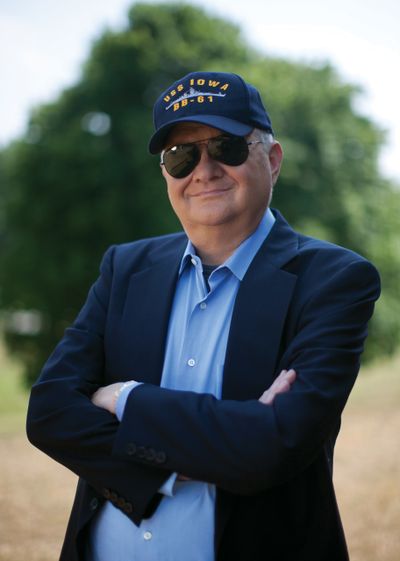‘Red October’ author Tom Clancy dies at 66
Military novelist known for extreme attention to detail

NEW YORK – In 1985, a year after the Cold War thriller “The Hunt for Red October” came out, author Tom Clancy was invited to lunch at the Reagan White House, where he was questioned by Navy Secretary John Lehman.
Who, the secretary wanted to know, gave Clancy access to all that secret material?
Clancy, the best-selling novelist who died Tuesday in Baltimore at 66, insisted then, and after, that his information was strictly unclassified: books, interviews and papers that were easily obtained. Also, two submarine officers reviewed the final manuscript.
In an interview with the New York Times in 1987, he explained that unclassified information can lead to insights about state secrets.
“One of the reasons we are so successful is that we have a free society with open access to information,” he said. “If you change that, if you try to close off the channels of information, we’ll end up just like the Russians, and their society does not work. The best way to turn America into another Russia is to emulate their methods of handling information.”
Government officials may have worried how Clancy knew that a Russian submarine spent only about 15 percent of its time at sea or how many SS-N-20 Seahawk missiles it carried. But his extreme attention to technical detail and accuracy earned him respect inside the intelligence community and beyond and helped make Clancy the most widely read and influential military novelist of his time, one who seemed to capture a shift in the country’s mood away from the CIA misdeeds that were exposed in the 1970s to the heroic feats of Clancy’s most famous creation, CIA analyst Jack Ryan.
“Thrillers, like all art, are always a reflection of the culture,” said fellow author Brad Meltzer. “No one captured that Cold War fear – and that uniquely American perspective – like Clancy. Jack Ryan wasn’t just a character. He was us. He was every American in those days when we were a push-of-the-button away from nuclear war.”
Fans couldn’t turn the pages fast enough and a number of his high-tech, geopolitical thrillers, including “The Hunt for Red October,” “Patriot Games” and “Clear and Present Danger,” were made into blockbuster movies, with another, “Jack Ryan,” set for release on Christmas.
Born in Baltimore on April 12, 1947, to a mailman and his wife, Clancy was fascinated by military history as a child. He entered Loyola College as a physics major but switched to English as a sophomore.
A tall, trim figure given to wearing sunglasses that made him look like a fighter pilot, Clancy had such a sure grasp of defense technology and spycraft that many readers were convinced he served in the military. But his experience was limited to ROTC classes in college. Near-sightedness kept him out of active duty.
After school, he worked in an insurance office that had military clients. Boredom with his job led him to try novels.
He was a political conservative who backed the Vietnam War as a college student and once referred to Ronald Reagan as “my president.” Clancy broke through commercially during a tense period of the Cold War, and with the help of Reagan himself.
In 1982, he began working on “The Hunt for Red October,” drawing inspiration from a real-life 1975 mutiny aboard a Soviet missile frigate. He sold the manuscript to the first publisher he tried, the Naval Institute Press, which had never bought original fiction. In real life, the mutiny was put down, but in Clancy’s book, a Soviet submarine skipper hands his vessel over to the U.S. and defects.
Someone thought enough of the novel to give it to Reagan as a Christmas gift. The president quipped at a dinner that he was losing sleep because he couldn’t put the book down – a statement Clancy later said helped put him on the New York Times best-seller list.
“What happened to me was pure dumb luck. I’m not the new Hemingway,” Clancy later said in an interview with the American Movie Channel.
“Of course, fortune does favor the brave. In battle, you forgive a man anything except an unwillingness to take risks. Sometimes you have to put it on the line. What I did was take time away from how I earned my living. My wife gave me hell. ‘Why are you doing this?’ But she doesn’t complain anymore.”
Clancy said his dream had been simply to publish a book, hopefully a good one, so that he would be in the Library of Congress catalog. His dreams were answered many times over.
His novels were dependable hits, his publisher estimating worldwide sales at more than 100 million copies.
Clancy’s publisher, Penguin Group (USA), announced his death but did not give the cause.